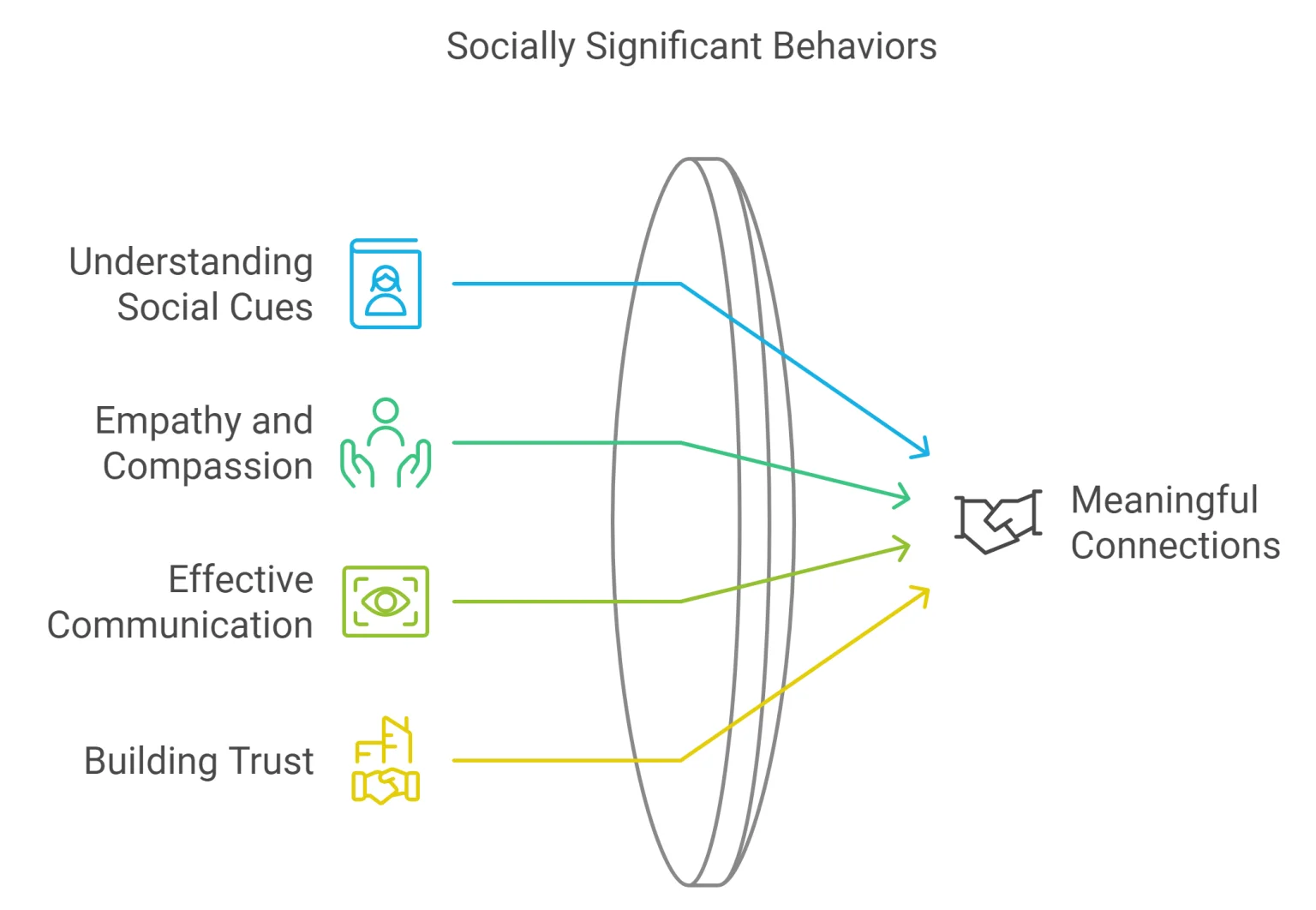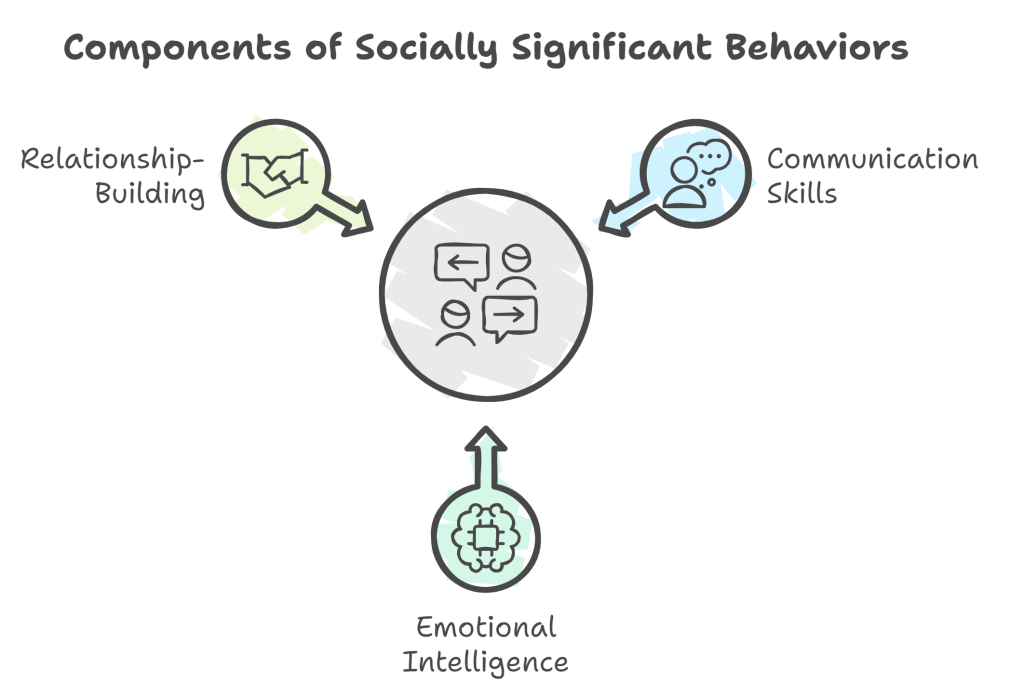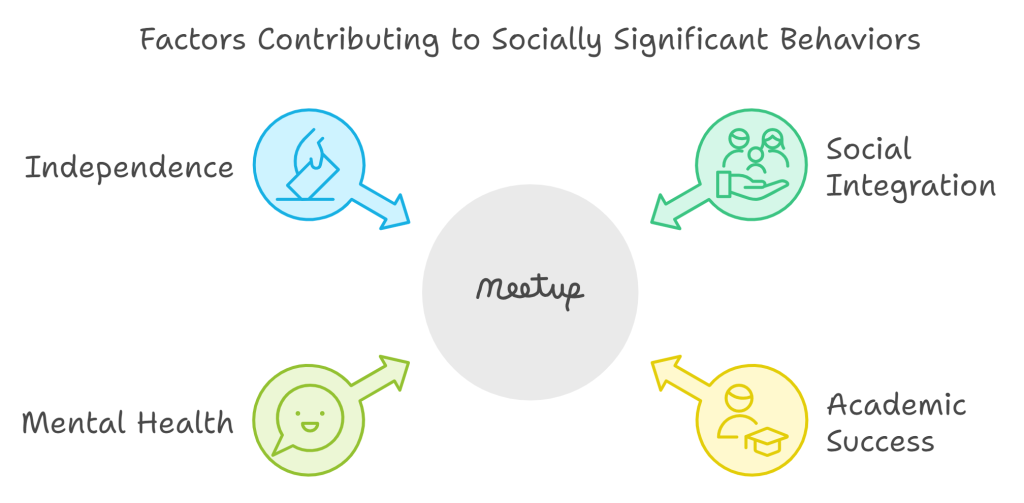Socially Significant Behaviors: Unlocking the Key to Meaningful Connections
ABA TherapyJuly 17, 2025

Socially significant behaviors are the foundation of meaningful connections and relationships. These behaviors, often referred to as social skills, enable individuals to interact with others effectively and build strong, lasting bonds. At Illuminate ABA, we understand the importance of developing socially significant behaviors and are dedicated to helping individuals achieve their full potential.
In this blog post, we'll explore the concept of socially significant behaviors, their importance, and practical strategies for developing and improving these skills.
What are Socially Significant Behaviors?

Socially significant behaviors are a complex set of skills that enable individuals to engage in appropriate, effective, and meaningful social interactions. These behaviors are essential for building and maintaining relationships, as they allow individuals to communicate their needs, share their thoughts and feelings, and connect with others on a deeper level.
Let's take a closer look at each of the key components of socially significant behaviors:
Initiating and Maintaining Conversations
The ability to start and sustain conversations is a fundamental social skill. This includes knowing how to introduce oneself, ask open-ended questions, actively listen, and respond appropriately to keep the conversation flowing. Maintaining conversations requires flexibility, as individuals must adapt their communication style to the context and the person they are talking to.
Making Eye Contact and Using Appropriate Body Language
Non-verbal communication, such as eye contact and body language, plays a crucial role in social interactions. Making appropriate eye contact conveys interest, confidence, and respect. Using open and relaxed body language, such as facing the person, uncrossing one's arms, and maintaining an upright posture, helps create a welcoming and engaged atmosphere.
Expressing Emotions in a Socially Acceptable Manner
Expressing emotions is an integral part of social interactions, but it's important to do so in a socially acceptable way. This means being able to identify and label one's own emotions, as well as recognizing and responding appropriately to the emotions of others. Individuals with strong socially significant behaviors can express their feelings in a way that is appropriate to the situation and respectful of others.
Understanding and Responding to Social Cues
Social interactions are full of subtle cues and unwritten rules that guide behavior. Individuals with strong socially significant behaviors are adept at reading and responding to these cues, such as facial expressions, tone of voice, and personal space. They can adjust their behavior accordingly to ensure that their actions are appropriate and well-received.
Cooperating and Collaborating with Others
Many social interactions involve working with others towards a common goal. Socially significant behaviors include the ability to cooperate, compromise, and collaborate effectively. This requires skills such as active listening, perspective-taking, and conflict resolution.
Resolving Conflicts and Negotiating Effectively
Conflicts are a natural part of social interactions, but individuals with strong socially significant behaviors have the skills to resolve them in a constructive manner. This includes being able to identify the source of the conflict, communicate one's needs and concerns, and work towards a mutually acceptable solution. Effective negotiation skills, such as compromise and assertiveness, are also important in conflict resolution.
These behaviors are essential for building and maintaining relationships, as they allow individuals to communicate their needs, share their thoughts and feelings, and connect with others on a deeper level.
The Importance of Socially Significant Behaviors

Socially significant behaviors are crucial for individuals of all ages and backgrounds. They play a vital role in:
- Social Integration: Developing socially significant behaviors helps individuals feel more comfortable and confident in social situations, making it easier for them to make friends, participate in group activities, and engage with their community.
- Academic and Professional Success: Strong social skills are often linked to academic and professional success. Individuals who can communicate effectively, work well with others, and navigate social situations tend to perform better in school and the workplace.
- Mental Health and Well-being: Positive social interactions and relationships are essential for mental health and overall well-being. Individuals who struggle with social skills may be at a higher risk of developing mental health issues such as depression, anxiety, and loneliness.
- Independence and Quality of Life: Socially significant behaviors enable individuals to live more independent and fulfilling lives. They can advocate for their needs, make informed decisions, and participate actively in their communities.
Strategies for Developing Socially Significant Behaviors
Developing socially significant behaviors is a process that requires practice, patience, and support. At Illuminate ABA, we use evidence-based strategies to help individuals improve their social skills. Some of these strategies include:
- Social Skills Training: Social skills training involves teaching individuals specific social skills through direct instruction, modeling, and role-playing. This approach helps individuals understand the importance of social skills and provides them with the tools they need to practice and apply these skills in real-world situations.
- Naturalistic Teaching: Naturalistic teaching involves using everyday situations and interactions as opportunities for learning and practicing social skills. This approach helps individuals generalize their skills to different contexts and settings, making it easier for them to apply what they've learned in real life.
- Peer-Mediated Instruction: Peer-mediated instruction involves using peers as models and facilitators for social skill development. This approach helps individuals learn from their peers, build positive relationships, and practice their skills in a supportive and natural environment.
- Visual Supports: Visual supports, such as social stories, scripts, and video modeling, can help individuals understand social situations and practice appropriate responses. These tools provide a structured and predictable framework for learning and applying social skills.
- Reinforcement and Feedback: Providing positive reinforcement and constructive feedback is essential for encouraging and reinforcing socially significant behaviors. At Illuminate ABA, we use a variety of reinforcement strategies, such as praise, rewards, and natural consequences, to help individuals stay motivated and engaged in the learning process.
Conclusion
Socially significant behaviors are the foundation of meaningful connections and relationships. By developing these skills, individuals can improve their social integration, academic and professional success, mental health and well-being, and overall quality of life.
At Illuminate ABA, we are committed to helping individuals of all ages and backgrounds develop socially significant behaviors. Through evidence-based strategies and personalized support, we empower individuals to build the skills they need to thrive in social situations and live fulfilling, independent lives.
If you or someone you know is interested in learning more about socially significant behaviors and how to develop these skills, we encourage you to contact us directly. Our team of experts is dedicated to providing high-quality, compassionate care and support to help individuals reach their full potential.
Read About: Motivating Operations in ABA Therapy
